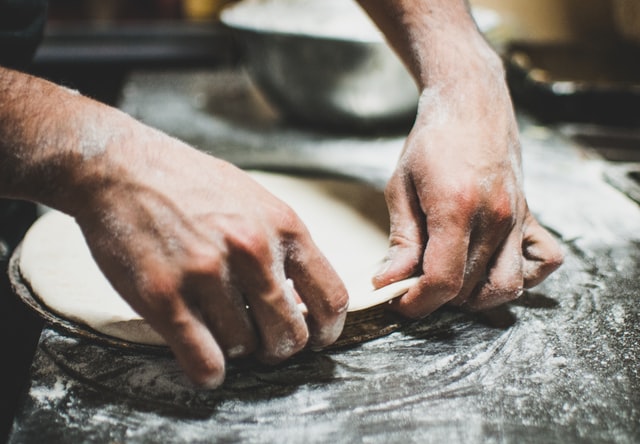Table of Contents
Why do you want to work as a pizza maker?
Because you love Italian cuisine and want to open your own restaurant in as few years time. And you want to do so with a BANG, making the very best pizza in town. Time to learn the basics in a good pizzeria, so you can later steal their winning recipes and benefit from them in your own place.
Because you are totally broke right now, and need money to pay your rent and bills. You are tired of sleeping in your car, which doesn’t even have air conditioning. Just need to make something happen quickly, or you’ll lose your mind. You do not even have enough money to buy the forsaken pizza slice, so you better get a job in a restaurant and at least save money eating the stuff you cook in work.
Maybe one of these is your real reason, but as you can likely guess, you should refer to something else in your interview answer. Perhaps you believe to have what it takes to become an excellent pizza maker–attention to detail, nose for good ingredients, ability to learn quickly and work quickly. Or you’ve done this job before. Instead of starting somewhere from scratch, you want to use your existing experience and continue in the same trade.
You should not sound desperate in your interview. They should have a feeling that you want the job (and not only need it), or at least that this isn’t your last option.
Why our pizzeria (restaurant, hotel)? Why not some other place?
Because you’ve been rejected everywhere else, and they are your last choice. Or because they offer a better salary than their competitors. Or you know one of the cooks working for them, and they gave you good references (not much work, laid back place, big tips, lot of opportunities to do nothing and smoke cigarettes on the terrace).
Maybe these are your reasons but once again, they do not make up for a good interview answer. Praise their place for something. You’ve read the reviews on Google and you were stunned by the great feedback they received from their customers. Surely they are doing something well there, and you’d like to become a part of their team.
Or logistics reasons decided it for you. Their opening hours and shift patterns suit your schedule, or you live nearby the place, and are tired of commuting to and fro work in your old car for hours. You want to work somewhere close to your apartment, and their pizzeria happens to be in the same location.
Why did you leave your last job? (Why do you want to leave your present job?)
Everyone knows the story. You felt they weren’t paying you good enough, and so you stole some change from a cash drawer each day. Not much, ten or twenty dollars maybe, or fifty sometimes. Nothing a big restaurant can feel–or at least that’s what you thought. You’d love to continue doing that for years, but they eventually found out, and threw you out of the door.
Or you said your boss that they were a piece of sh*t and treated you like a piece of garbage, which they indeed were and did, but they didn’t like to hear the truth. Again, you had to go.
As you can guess, even if this really happened to you, you should not say so. If you stole money somewhere before, you shouldn’t even list that employment on your resume. Because if they called your former manager and heard the story it would be an immediate showstopper.
Say rather that you weren’t challenged there anymore, or that the shift patterns or atmosphere in the workplace didn’t suit you. Or that it was a temporary placement right from the start (you just replaced someone on maternity leave or drug rehab or whatever). They came back and you had to go. No negative emotions though… You left and you are ready for a new challenge.
* May also interest you: Cook interview questions.
Can you tell us more about your previous experience in the field?
Experience is not necessary for a pizza maker, but it will help. If you do not have any experience working in a real pizza place, you can at least talk about experiences from your own kitchen.
You watch famous Italian cooks on YouTube, you bought a pizza stone, and you make the best pizza in the neighborhood. You’ve fallen in love with the profession, and can’t wait to turn your hobby into a well paid (or least paid) job.
Of course if you worked somewhere else (and they didn’t throw you out of the door), you should narrate the experience. Emphasize that you were busy in work, that you always had your hands full, and that customers were pleased with the taste of your food.
Actually any working experience is better than none. Even if you just swept the streets or bothered people in the call center, or worked in BK or KFC, you learned basic working habits and responsibility. It will certainly help you in your new job.
How do you feel about working for 12 hours in one go? What about weekends?
An obvious drawback of any job in a restaurant or pizzeria are working hours. Because people mostly go to eat outside when they are not working–in the evening, on Sunday, etc. That’s when you will have to make the pizza–many of them.
Ensure the interviewers that you read the job description carefully. You are aware of the nuances of this business, and expect to work during the weekend–at least sometimes. Show some flexibility and collegiality. When you make a pizza on Sunday, it means that your colleague, another pizza maker, can enjoy a free day with family and friends (unless they are in debt of course, and have a second job).
You are okay with working at any time of the day and on any day of the year, as long as you are properly compensated for your efforts.
The workload can be pretty heavy here at times. How do you want to handle it?
There’s no magical solution to a heavy workload. You will simply work hard, try to be fast, and you won’t let the pressure to get into your head–because that would not help anyone in the restaurant.
Tell them that you know about low times and peak times that restaurants experience. You are ready to maximize your efforts during the peak hours, doing whatever you can to make a good pizza and to make it quick, working in this fast-paced environment. Later on, when the restaurant is empty (or almost empty), you’ll have time for a rest, toilet break, and whatever.
What does an excellent customer service mean to you?
To deliver what is expected, or to even exceed the expectations of the customers. If they order “fungi” you won’t make “diavola”.
If they want extra pepperoni, mushrooms, cheese, or even french fries on the top of their pizza (I’ve seen it several times and I am sure each Italian cook would cry in such a moment), you would give it to them. Basically excellent customer service means listening carefully to the customer, and trying to give them what they want from you–even if it is a clearly stupid thing or combination of ingredients.
You can even add that great customer service is your first priority, and you want to deliver it to each and every customer.
How long do you want to have this job?
Probably only until you find something better, or until you save enough money to start your own business, to study, to travel the world, or to do whatever you want to do with your future.
As you can guess, however, these are not good interview answers. All restaurants and pizzerias battle with high job-hopping rates, and they struggle to hire new quality staff. When they finally have such a great pizza maker like you in their team, they do not want to see you go in a few weeks or months…
Ensure them that you have just the best associations with their restaurant. If they hire you, you have no plans of leaving the place–as long as they are satisfied with your work, of course. Or you can say that you simply do not think much about future, and will see what the next years will bring.
Needless to say, you do not have to fulfill your promises from an interview. You are backed by labor law. If you decide to leave their place after a week, you can do so. But when you try to get a job, you should tell them what they want to hear from you. In this case they want to hear that you plan to stay.
What are your salary expectations?
5 grand a month would be nice. Or even 7 grand. And why not? You are the most amazing pizza maker (in the making) and you should be compensated accordingly.
The only problem is that the margins are razor thin in hospitality business. They cannot afford to pay you more than $12-$16 per hour, because they would get bankrupt if they did so.
Be realistic in your expectations. Ask for $13 as a start. Or tell them that salary in not the deciding factor for you, and that you will accept the standard salary offer they pay to each new hire for this job.
They would not pay you more anyway, so no need to try your luck…
Do you have any questions?
You do not have to force it, but you should not sign anything without being aware of the job conditions. Ask them to show you the kitchen, your workplace. Inquire about working hours and shift patterns–if they didn’t explain it clearly during the interview.
And if they didn’t say anything about your salary (and a possibility of sharing tips with other staff member), ask them how much they will pay you.
Some restaurants and pizzerias are ran by strange charterers, and sometimes we can speak about a shady business. If something doesn’t feel right to you, you should not agree to accept the job–at least until they explain everything clearly and include it on the contract…
Ready to ace your pizza maker interview? Not yet? Check also the following articles to prepare for the meeting with the employer:
- Guide on how to overcome interview nerves
- Kitchen helper interview questions.
- Restaurant job interview – What are your strengths and weaknesses?


